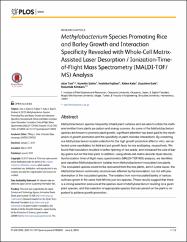Methylobacterium Species Promoting Rice and Barley Growth and Interaction Specificity Revealed with Whole-Cell Matrix-Assisted Laser Desorption/Ionization-Time-of-Flight Mass Spectrometry (MALDI-TOF/MS) Analysis
Abstract
Methylobacterium species frequently inhabit plant surfaces and are able to utilize the methanol emitted from plants as carbon and energy sources. As some of the Methylobacterium species are known to promote plant growth, significant attention has been paid to the mechanism of growth promotion and the specificity of plant-microbe interactions. By screening our Methylobacterium isolate collection for the high growth promotion effect in vitro, we selected some candidates for field and pot growth tests for rice and barley, respectively. We found that inoculation resulted in better ripening of rice seeds, and increased the size of barley grains but not the total yield. In addition, using whole-cell matrix-assister laser desorption/ionization-time-of-flight mass spectrometry (MALDI-TOF/MS) analysis, we identified and classified Methylobacterium isolates from Methylobacterium-inoculated rice plants. The inoculated species could not be recovered from the rice plants, and in some cases, the Methylobacterium community structure was affected by the inoculation, but not with predomination of the inoculated species. The isolates from non-inoculated barley of various cultivars grown in the same field fell into just two species. These results suggest that there is a strong selection pressure at the species level of Methylobacterium residing on a given plant species, and that selection of


















